Technology in Audit Engagements: Distributed Ledgers & More
VerifiedAdded on 2022/10/01
|11
|2168
|364
Essay
AI Summary
This essay explores the impact of advanced technologies on the auditing profession, focusing on Distributed Ledger Technology, Smart Contracts, and Cloud Technologies. Distributed Ledger Technology enhances audit trails and reduces manipulation risks, while Smart Contracts aid in analyzing blockchain applications and identifying security vulnerabilities. Cloud Technologies offer cost-effective solutions for data storage and analytical procedures, improving communication and efficiency within audit teams. The essay argues that while these technologies enhance audit processes, they cannot fully replace human auditors due to the need for professional skepticism and judgment. The analysis justifies the selection of these technologies by detailing their specific advantages and applications in modern auditing practices, highlighting their role in improving data analysis, real-time auditing, and overall audit effectiveness.
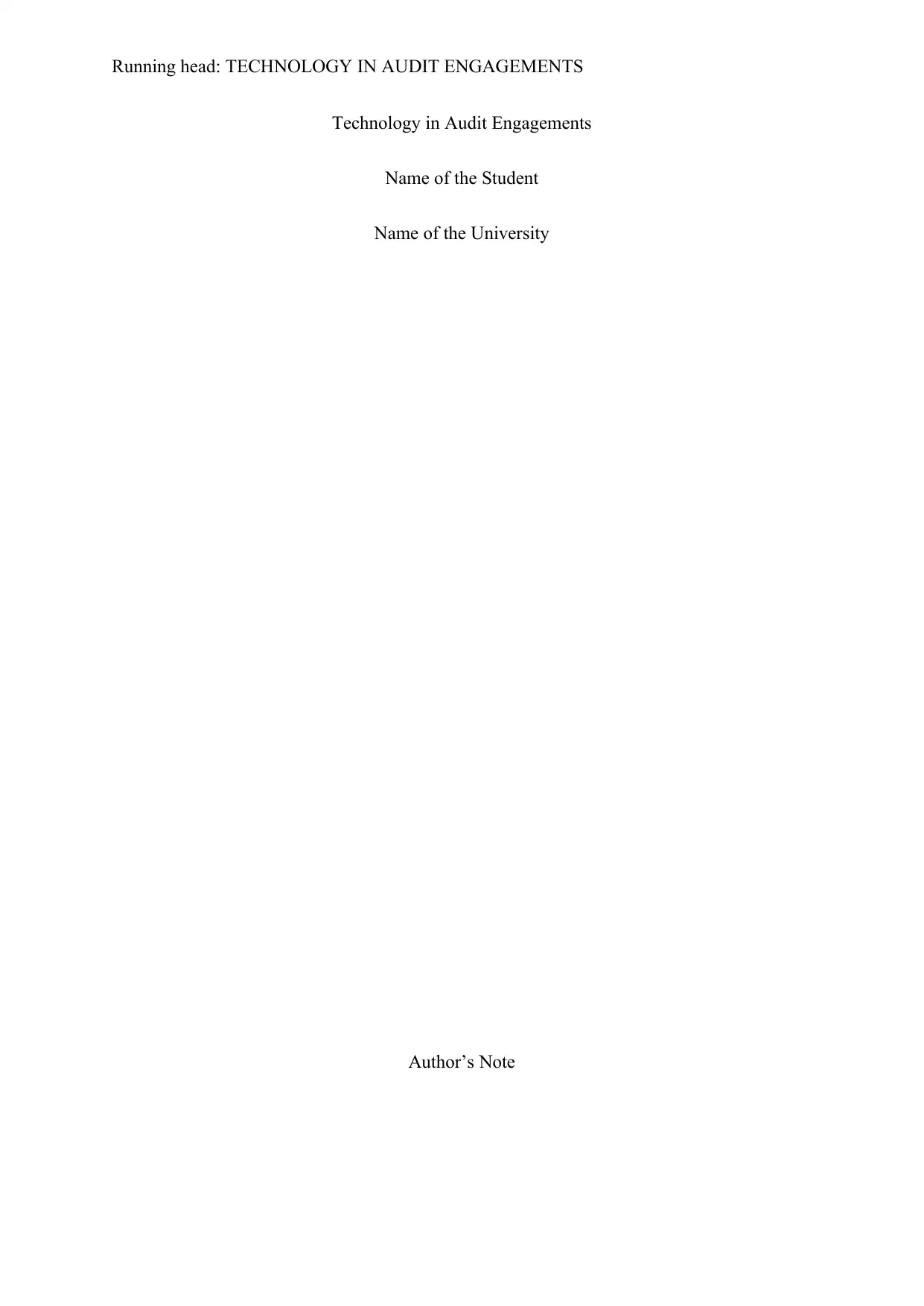
Running head: TECHNOLOGY IN AUDIT ENGAGEMENTS
Technology in Audit Engagements
Name of the Student
Name of the University
Author’s Note
Technology in Audit Engagements
Name of the Student
Name of the University
Author’s Note
Paraphrase This Document
Need a fresh take? Get an instant paraphrase of this document with our AI Paraphraser
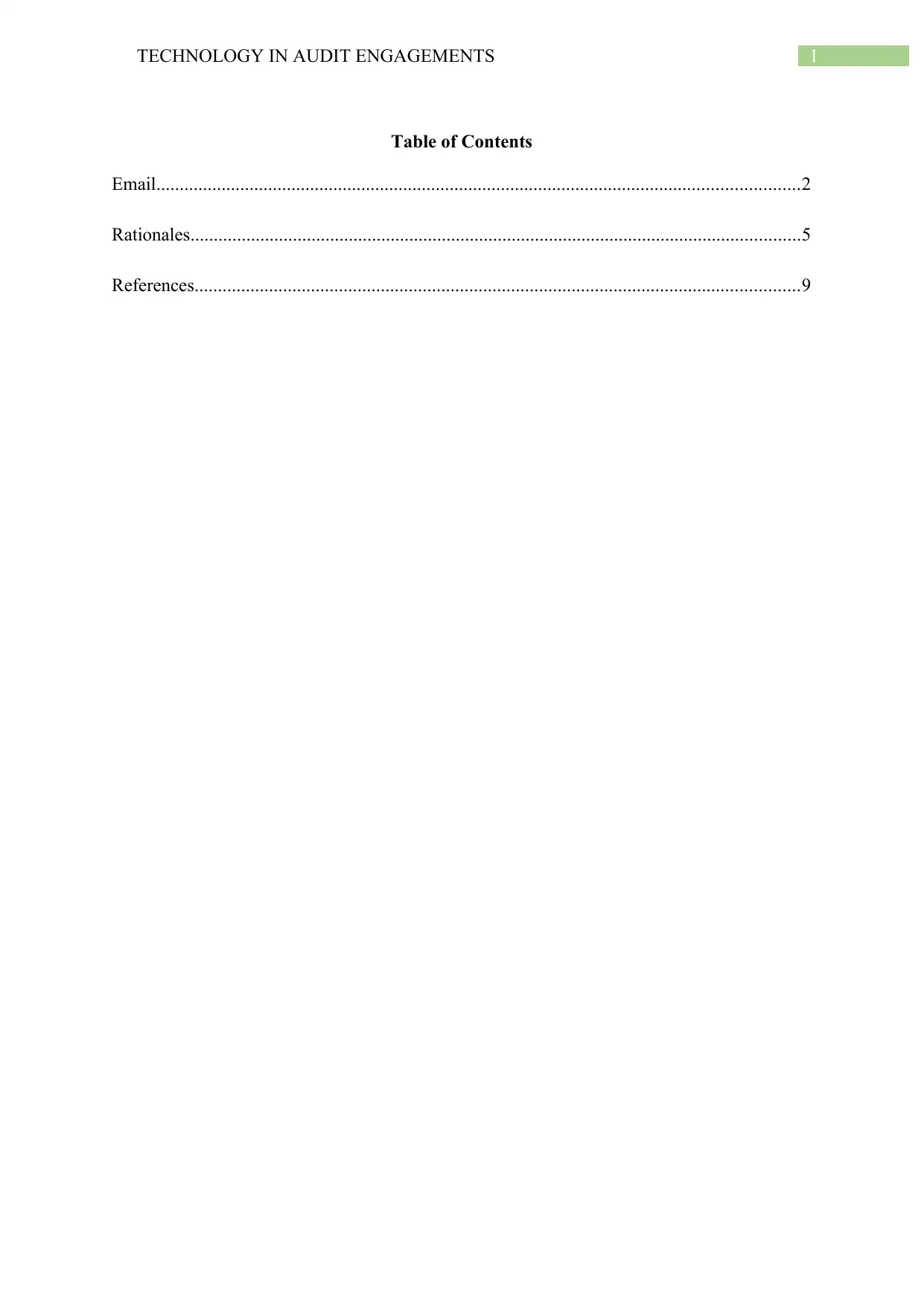
1TECHNOLOGY IN AUDIT ENGAGEMENTS
Table of Contents
Email..........................................................................................................................................2
Rationales...................................................................................................................................5
References..................................................................................................................................9
Table of Contents
Email..........................................................................................................................................2
Rationales...................................................................................................................................5
References..................................................................................................................................9
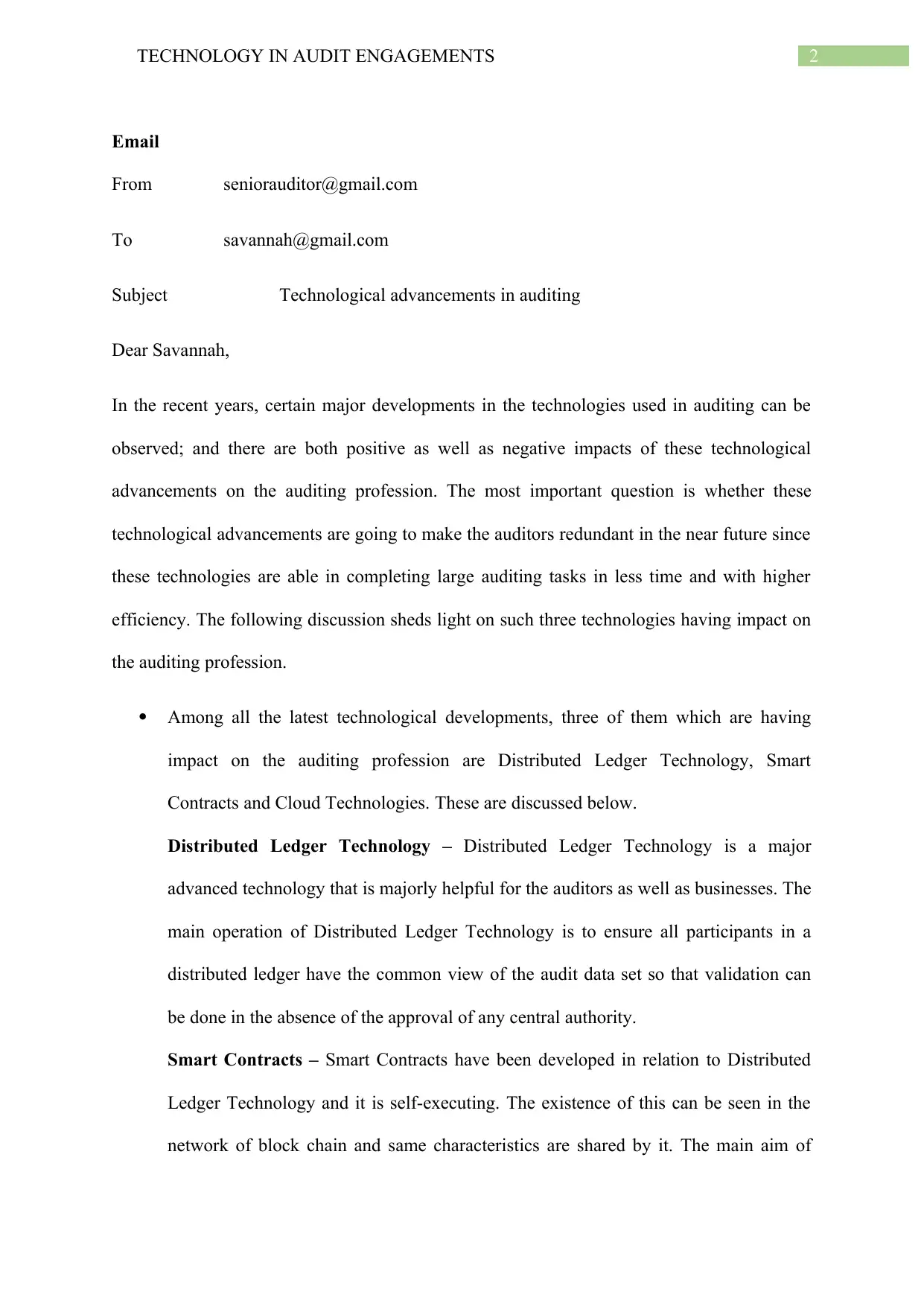
2TECHNOLOGY IN AUDIT ENGAGEMENTS
Email
From seniorauditor@gmail.com
To savannah@gmail.com
Subject Technological advancements in auditing
Dear Savannah,
In the recent years, certain major developments in the technologies used in auditing can be
observed; and there are both positive as well as negative impacts of these technological
advancements on the auditing profession. The most important question is whether these
technological advancements are going to make the auditors redundant in the near future since
these technologies are able in completing large auditing tasks in less time and with higher
efficiency. The following discussion sheds light on such three technologies having impact on
the auditing profession.
Among all the latest technological developments, three of them which are having
impact on the auditing profession are Distributed Ledger Technology, Smart
Contracts and Cloud Technologies. These are discussed below.
Distributed Ledger Technology – Distributed Ledger Technology is a major
advanced technology that is majorly helpful for the auditors as well as businesses. The
main operation of Distributed Ledger Technology is to ensure all participants in a
distributed ledger have the common view of the audit data set so that validation can
be done in the absence of the approval of any central authority.
Smart Contracts – Smart Contracts have been developed in relation to Distributed
Ledger Technology and it is self-executing. The existence of this can be seen in the
network of block chain and same characteristics are shared by it. The main aim of
From seniorauditor@gmail.com
To savannah@gmail.com
Subject Technological advancements in auditing
Dear Savannah,
In the recent years, certain major developments in the technologies used in auditing can be
observed; and there are both positive as well as negative impacts of these technological
advancements on the auditing profession. The most important question is whether these
technological advancements are going to make the auditors redundant in the near future since
these technologies are able in completing large auditing tasks in less time and with higher
efficiency. The following discussion sheds light on such three technologies having impact on
the auditing profession.
Among all the latest technological developments, three of them which are having
impact on the auditing profession are Distributed Ledger Technology, Smart
Contracts and Cloud Technologies. These are discussed below.
Distributed Ledger Technology – Distributed Ledger Technology is a major
advanced technology that is majorly helpful for the auditors as well as businesses. The
main operation of Distributed Ledger Technology is to ensure all participants in a
distributed ledger have the common view of the audit data set so that validation can
be done in the absence of the approval of any central authority.
Smart Contracts – Smart Contracts have been developed in relation to Distributed
Ledger Technology and it is self-executing. The existence of this can be seen in the
network of block chain and same characteristics are shared by it. The main aim of
⊘ This is a preview!⊘
Do you want full access?
Subscribe today to unlock all pages.

Trusted by 1+ million students worldwide
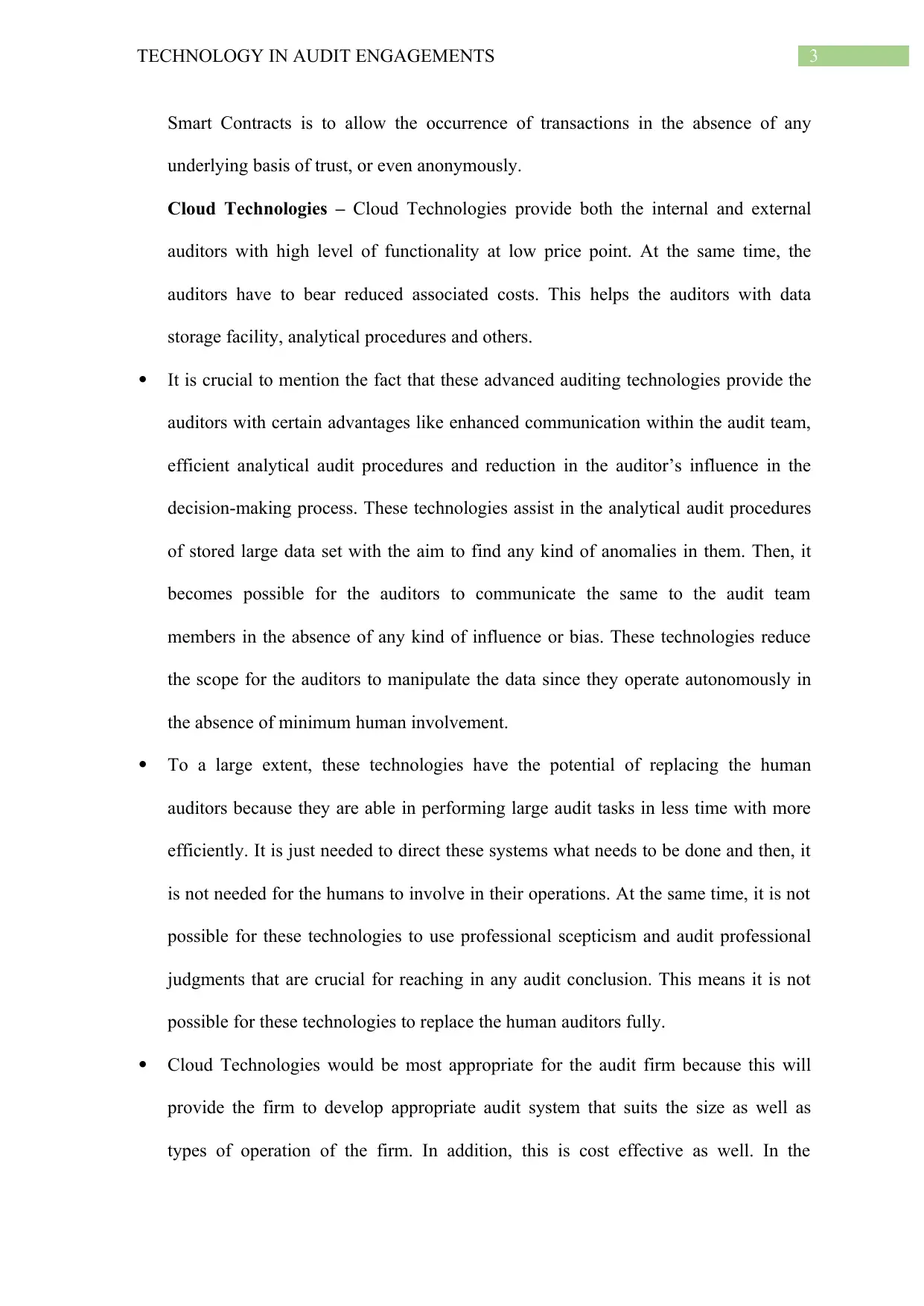
3TECHNOLOGY IN AUDIT ENGAGEMENTS
Smart Contracts is to allow the occurrence of transactions in the absence of any
underlying basis of trust, or even anonymously.
Cloud Technologies – Cloud Technologies provide both the internal and external
auditors with high level of functionality at low price point. At the same time, the
auditors have to bear reduced associated costs. This helps the auditors with data
storage facility, analytical procedures and others.
It is crucial to mention the fact that these advanced auditing technologies provide the
auditors with certain advantages like enhanced communication within the audit team,
efficient analytical audit procedures and reduction in the auditor’s influence in the
decision-making process. These technologies assist in the analytical audit procedures
of stored large data set with the aim to find any kind of anomalies in them. Then, it
becomes possible for the auditors to communicate the same to the audit team
members in the absence of any kind of influence or bias. These technologies reduce
the scope for the auditors to manipulate the data since they operate autonomously in
the absence of minimum human involvement.
To a large extent, these technologies have the potential of replacing the human
auditors because they are able in performing large audit tasks in less time with more
efficiently. It is just needed to direct these systems what needs to be done and then, it
is not needed for the humans to involve in their operations. At the same time, it is not
possible for these technologies to use professional scepticism and audit professional
judgments that are crucial for reaching in any audit conclusion. This means it is not
possible for these technologies to replace the human auditors fully.
Cloud Technologies would be most appropriate for the audit firm because this will
provide the firm to develop appropriate audit system that suits the size as well as
types of operation of the firm. In addition, this is cost effective as well. In the
Smart Contracts is to allow the occurrence of transactions in the absence of any
underlying basis of trust, or even anonymously.
Cloud Technologies – Cloud Technologies provide both the internal and external
auditors with high level of functionality at low price point. At the same time, the
auditors have to bear reduced associated costs. This helps the auditors with data
storage facility, analytical procedures and others.
It is crucial to mention the fact that these advanced auditing technologies provide the
auditors with certain advantages like enhanced communication within the audit team,
efficient analytical audit procedures and reduction in the auditor’s influence in the
decision-making process. These technologies assist in the analytical audit procedures
of stored large data set with the aim to find any kind of anomalies in them. Then, it
becomes possible for the auditors to communicate the same to the audit team
members in the absence of any kind of influence or bias. These technologies reduce
the scope for the auditors to manipulate the data since they operate autonomously in
the absence of minimum human involvement.
To a large extent, these technologies have the potential of replacing the human
auditors because they are able in performing large audit tasks in less time with more
efficiently. It is just needed to direct these systems what needs to be done and then, it
is not needed for the humans to involve in their operations. At the same time, it is not
possible for these technologies to use professional scepticism and audit professional
judgments that are crucial for reaching in any audit conclusion. This means it is not
possible for these technologies to replace the human auditors fully.
Cloud Technologies would be most appropriate for the audit firm because this will
provide the firm to develop appropriate audit system that suits the size as well as
types of operation of the firm. In addition, this is cost effective as well. In the
Paraphrase This Document
Need a fresh take? Get an instant paraphrase of this document with our AI Paraphraser
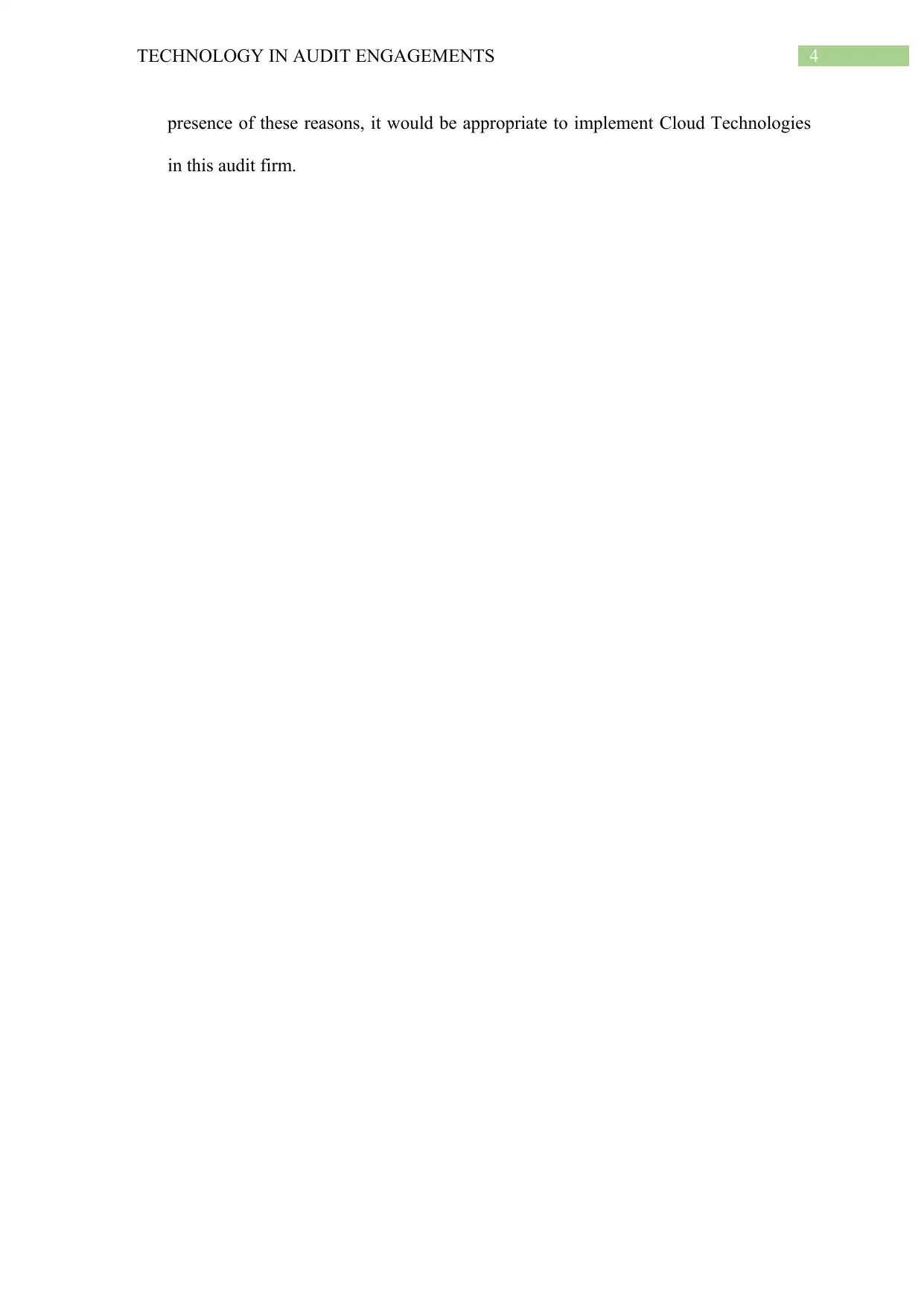
4TECHNOLOGY IN AUDIT ENGAGEMENTS
presence of these reasons, it would be appropriate to implement Cloud Technologies
in this audit firm.
presence of these reasons, it would be appropriate to implement Cloud Technologies
in this audit firm.
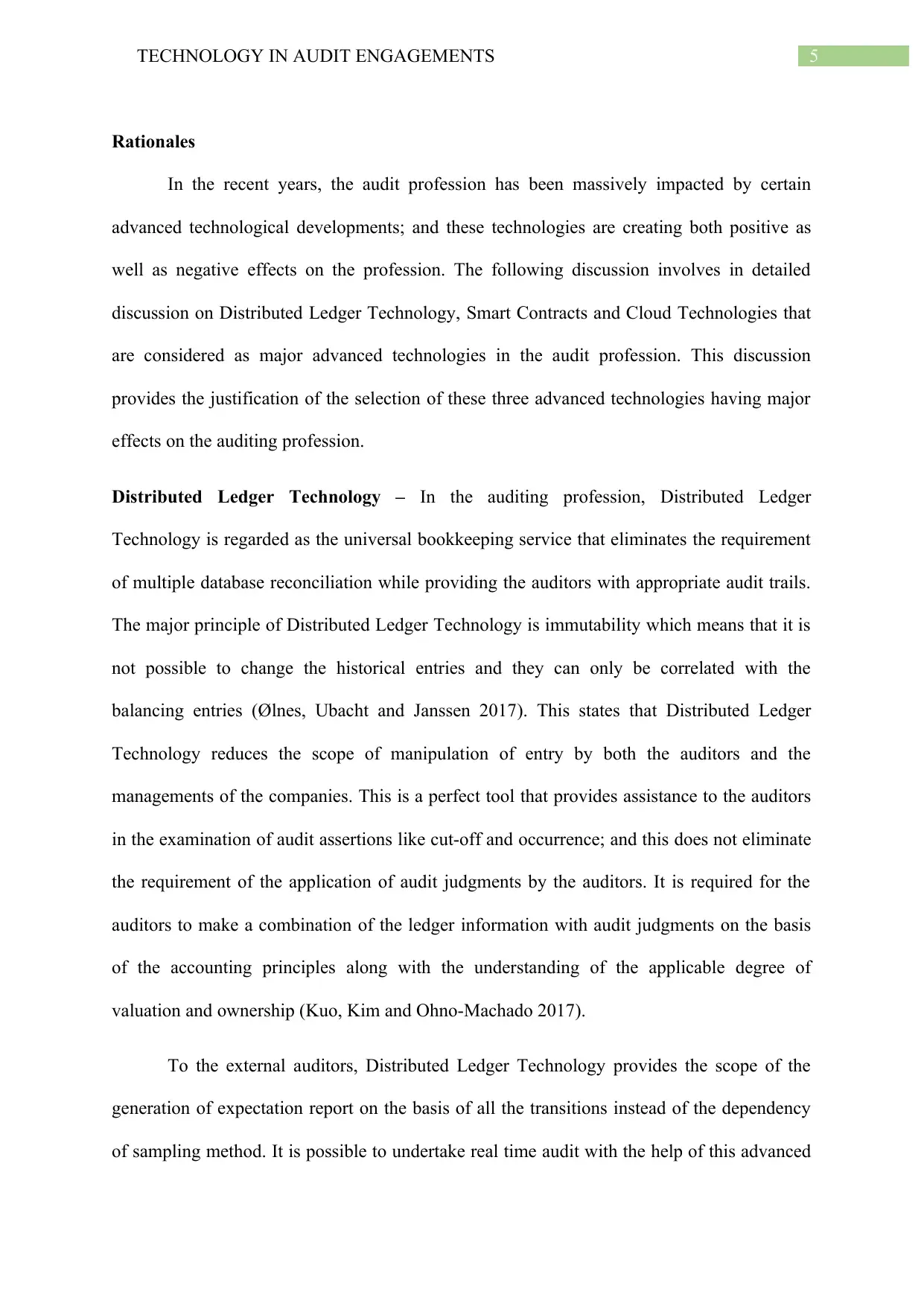
5TECHNOLOGY IN AUDIT ENGAGEMENTS
Rationales
In the recent years, the audit profession has been massively impacted by certain
advanced technological developments; and these technologies are creating both positive as
well as negative effects on the profession. The following discussion involves in detailed
discussion on Distributed Ledger Technology, Smart Contracts and Cloud Technologies that
are considered as major advanced technologies in the audit profession. This discussion
provides the justification of the selection of these three advanced technologies having major
effects on the auditing profession.
Distributed Ledger Technology – In the auditing profession, Distributed Ledger
Technology is regarded as the universal bookkeeping service that eliminates the requirement
of multiple database reconciliation while providing the auditors with appropriate audit trails.
The major principle of Distributed Ledger Technology is immutability which means that it is
not possible to change the historical entries and they can only be correlated with the
balancing entries (Ølnes, Ubacht and Janssen 2017). This states that Distributed Ledger
Technology reduces the scope of manipulation of entry by both the auditors and the
managements of the companies. This is a perfect tool that provides assistance to the auditors
in the examination of audit assertions like cut-off and occurrence; and this does not eliminate
the requirement of the application of audit judgments by the auditors. It is required for the
auditors to make a combination of the ledger information with audit judgments on the basis
of the accounting principles along with the understanding of the applicable degree of
valuation and ownership (Kuo, Kim and Ohno-Machado 2017).
To the external auditors, Distributed Ledger Technology provides the scope of the
generation of expectation report on the basis of all the transitions instead of the dependency
of sampling method. It is possible to undertake real time audit with the help of this advanced
Rationales
In the recent years, the audit profession has been massively impacted by certain
advanced technological developments; and these technologies are creating both positive as
well as negative effects on the profession. The following discussion involves in detailed
discussion on Distributed Ledger Technology, Smart Contracts and Cloud Technologies that
are considered as major advanced technologies in the audit profession. This discussion
provides the justification of the selection of these three advanced technologies having major
effects on the auditing profession.
Distributed Ledger Technology – In the auditing profession, Distributed Ledger
Technology is regarded as the universal bookkeeping service that eliminates the requirement
of multiple database reconciliation while providing the auditors with appropriate audit trails.
The major principle of Distributed Ledger Technology is immutability which means that it is
not possible to change the historical entries and they can only be correlated with the
balancing entries (Ølnes, Ubacht and Janssen 2017). This states that Distributed Ledger
Technology reduces the scope of manipulation of entry by both the auditors and the
managements of the companies. This is a perfect tool that provides assistance to the auditors
in the examination of audit assertions like cut-off and occurrence; and this does not eliminate
the requirement of the application of audit judgments by the auditors. It is required for the
auditors to make a combination of the ledger information with audit judgments on the basis
of the accounting principles along with the understanding of the applicable degree of
valuation and ownership (Kuo, Kim and Ohno-Machado 2017).
To the external auditors, Distributed Ledger Technology provides the scope of the
generation of expectation report on the basis of all the transitions instead of the dependency
of sampling method. It is possible to undertake real time audit with the help of this advanced
⊘ This is a preview!⊘
Do you want full access?
Subscribe today to unlock all pages.

Trusted by 1+ million students worldwide
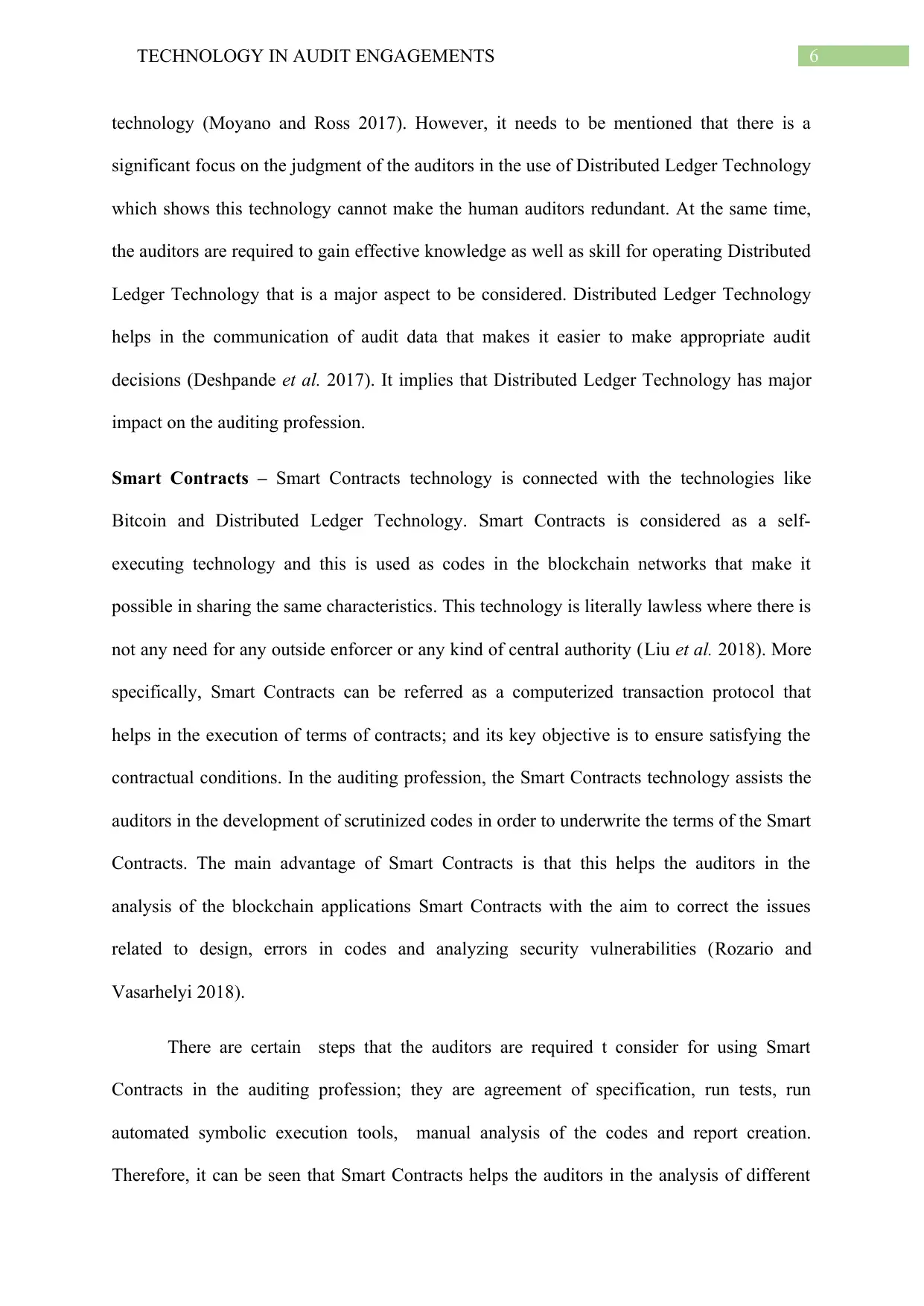
6TECHNOLOGY IN AUDIT ENGAGEMENTS
technology (Moyano and Ross 2017). However, it needs to be mentioned that there is a
significant focus on the judgment of the auditors in the use of Distributed Ledger Technology
which shows this technology cannot make the human auditors redundant. At the same time,
the auditors are required to gain effective knowledge as well as skill for operating Distributed
Ledger Technology that is a major aspect to be considered. Distributed Ledger Technology
helps in the communication of audit data that makes it easier to make appropriate audit
decisions (Deshpande et al. 2017). It implies that Distributed Ledger Technology has major
impact on the auditing profession.
Smart Contracts – Smart Contracts technology is connected with the technologies like
Bitcoin and Distributed Ledger Technology. Smart Contracts is considered as a self-
executing technology and this is used as codes in the blockchain networks that make it
possible in sharing the same characteristics. This technology is literally lawless where there is
not any need for any outside enforcer or any kind of central authority (Liu et al. 2018). More
specifically, Smart Contracts can be referred as a computerized transaction protocol that
helps in the execution of terms of contracts; and its key objective is to ensure satisfying the
contractual conditions. In the auditing profession, the Smart Contracts technology assists the
auditors in the development of scrutinized codes in order to underwrite the terms of the Smart
Contracts. The main advantage of Smart Contracts is that this helps the auditors in the
analysis of the blockchain applications Smart Contracts with the aim to correct the issues
related to design, errors in codes and analyzing security vulnerabilities (Rozario and
Vasarhelyi 2018).
There are certain steps that the auditors are required t consider for using Smart
Contracts in the auditing profession; they are agreement of specification, run tests, run
automated symbolic execution tools, manual analysis of the codes and report creation.
Therefore, it can be seen that Smart Contracts helps the auditors in the analysis of different
technology (Moyano and Ross 2017). However, it needs to be mentioned that there is a
significant focus on the judgment of the auditors in the use of Distributed Ledger Technology
which shows this technology cannot make the human auditors redundant. At the same time,
the auditors are required to gain effective knowledge as well as skill for operating Distributed
Ledger Technology that is a major aspect to be considered. Distributed Ledger Technology
helps in the communication of audit data that makes it easier to make appropriate audit
decisions (Deshpande et al. 2017). It implies that Distributed Ledger Technology has major
impact on the auditing profession.
Smart Contracts – Smart Contracts technology is connected with the technologies like
Bitcoin and Distributed Ledger Technology. Smart Contracts is considered as a self-
executing technology and this is used as codes in the blockchain networks that make it
possible in sharing the same characteristics. This technology is literally lawless where there is
not any need for any outside enforcer or any kind of central authority (Liu et al. 2018). More
specifically, Smart Contracts can be referred as a computerized transaction protocol that
helps in the execution of terms of contracts; and its key objective is to ensure satisfying the
contractual conditions. In the auditing profession, the Smart Contracts technology assists the
auditors in the development of scrutinized codes in order to underwrite the terms of the Smart
Contracts. The main advantage of Smart Contracts is that this helps the auditors in the
analysis of the blockchain applications Smart Contracts with the aim to correct the issues
related to design, errors in codes and analyzing security vulnerabilities (Rozario and
Vasarhelyi 2018).
There are certain steps that the auditors are required t consider for using Smart
Contracts in the auditing profession; they are agreement of specification, run tests, run
automated symbolic execution tools, manual analysis of the codes and report creation.
Therefore, it can be seen that Smart Contracts helps the auditors in the analysis of different
Paraphrase This Document
Need a fresh take? Get an instant paraphrase of this document with our AI Paraphraser
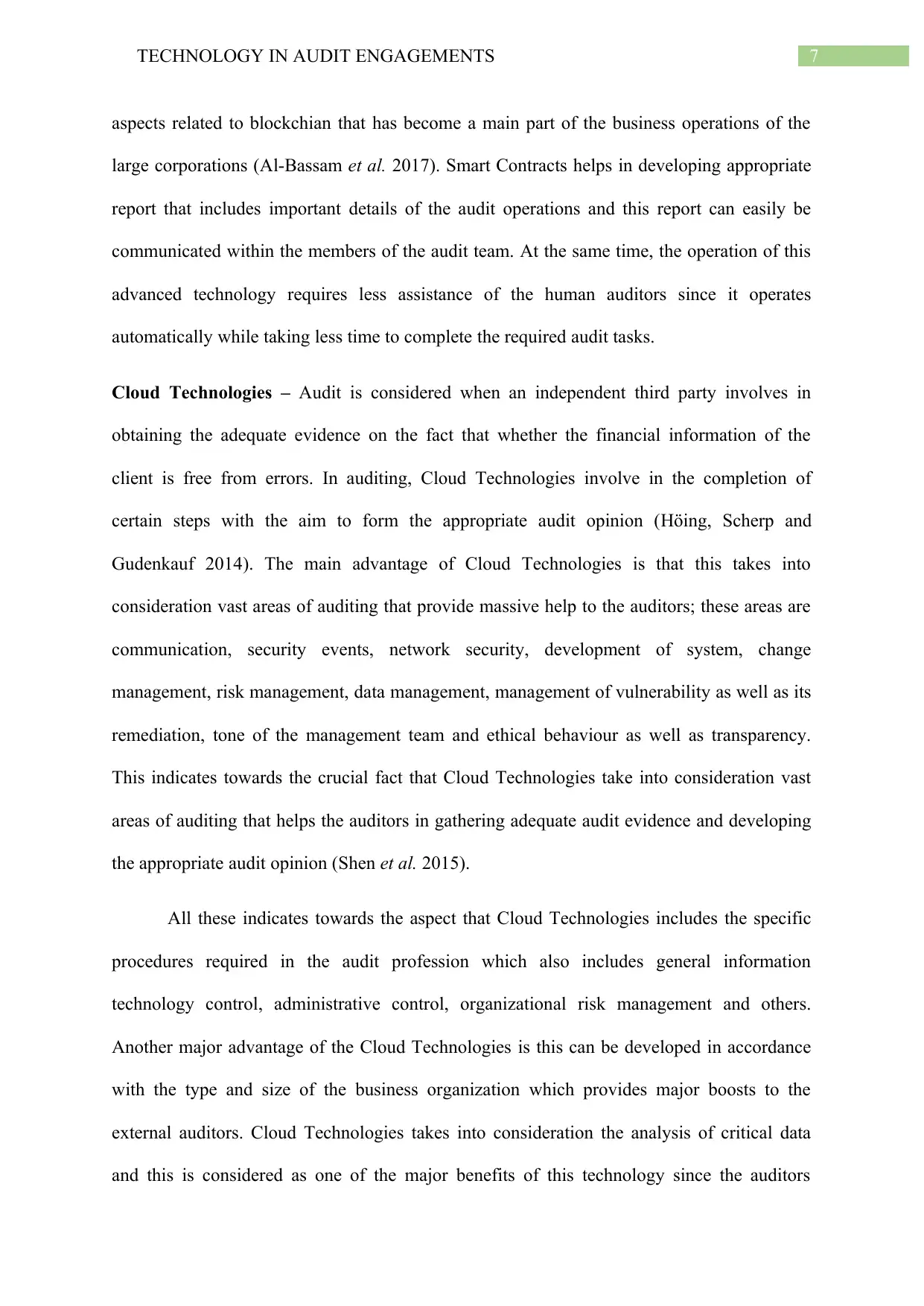
7TECHNOLOGY IN AUDIT ENGAGEMENTS
aspects related to blockchian that has become a main part of the business operations of the
large corporations (Al-Bassam et al. 2017). Smart Contracts helps in developing appropriate
report that includes important details of the audit operations and this report can easily be
communicated within the members of the audit team. At the same time, the operation of this
advanced technology requires less assistance of the human auditors since it operates
automatically while taking less time to complete the required audit tasks.
Cloud Technologies – Audit is considered when an independent third party involves in
obtaining the adequate evidence on the fact that whether the financial information of the
client is free from errors. In auditing, Cloud Technologies involve in the completion of
certain steps with the aim to form the appropriate audit opinion (Höing, Scherp and
Gudenkauf 2014). The main advantage of Cloud Technologies is that this takes into
consideration vast areas of auditing that provide massive help to the auditors; these areas are
communication, security events, network security, development of system, change
management, risk management, data management, management of vulnerability as well as its
remediation, tone of the management team and ethical behaviour as well as transparency.
This indicates towards the crucial fact that Cloud Technologies take into consideration vast
areas of auditing that helps the auditors in gathering adequate audit evidence and developing
the appropriate audit opinion (Shen et al. 2015).
All these indicates towards the aspect that Cloud Technologies includes the specific
procedures required in the audit profession which also includes general information
technology control, administrative control, organizational risk management and others.
Another major advantage of the Cloud Technologies is this can be developed in accordance
with the type and size of the business organization which provides major boosts to the
external auditors. Cloud Technologies takes into consideration the analysis of critical data
and this is considered as one of the major benefits of this technology since the auditors
aspects related to blockchian that has become a main part of the business operations of the
large corporations (Al-Bassam et al. 2017). Smart Contracts helps in developing appropriate
report that includes important details of the audit operations and this report can easily be
communicated within the members of the audit team. At the same time, the operation of this
advanced technology requires less assistance of the human auditors since it operates
automatically while taking less time to complete the required audit tasks.
Cloud Technologies – Audit is considered when an independent third party involves in
obtaining the adequate evidence on the fact that whether the financial information of the
client is free from errors. In auditing, Cloud Technologies involve in the completion of
certain steps with the aim to form the appropriate audit opinion (Höing, Scherp and
Gudenkauf 2014). The main advantage of Cloud Technologies is that this takes into
consideration vast areas of auditing that provide massive help to the auditors; these areas are
communication, security events, network security, development of system, change
management, risk management, data management, management of vulnerability as well as its
remediation, tone of the management team and ethical behaviour as well as transparency.
This indicates towards the crucial fact that Cloud Technologies take into consideration vast
areas of auditing that helps the auditors in gathering adequate audit evidence and developing
the appropriate audit opinion (Shen et al. 2015).
All these indicates towards the aspect that Cloud Technologies includes the specific
procedures required in the audit profession which also includes general information
technology control, administrative control, organizational risk management and others.
Another major advantage of the Cloud Technologies is this can be developed in accordance
with the type and size of the business organization which provides major boosts to the
external auditors. Cloud Technologies takes into consideration the analysis of critical data
and this is considered as one of the major benefits of this technology since the auditors
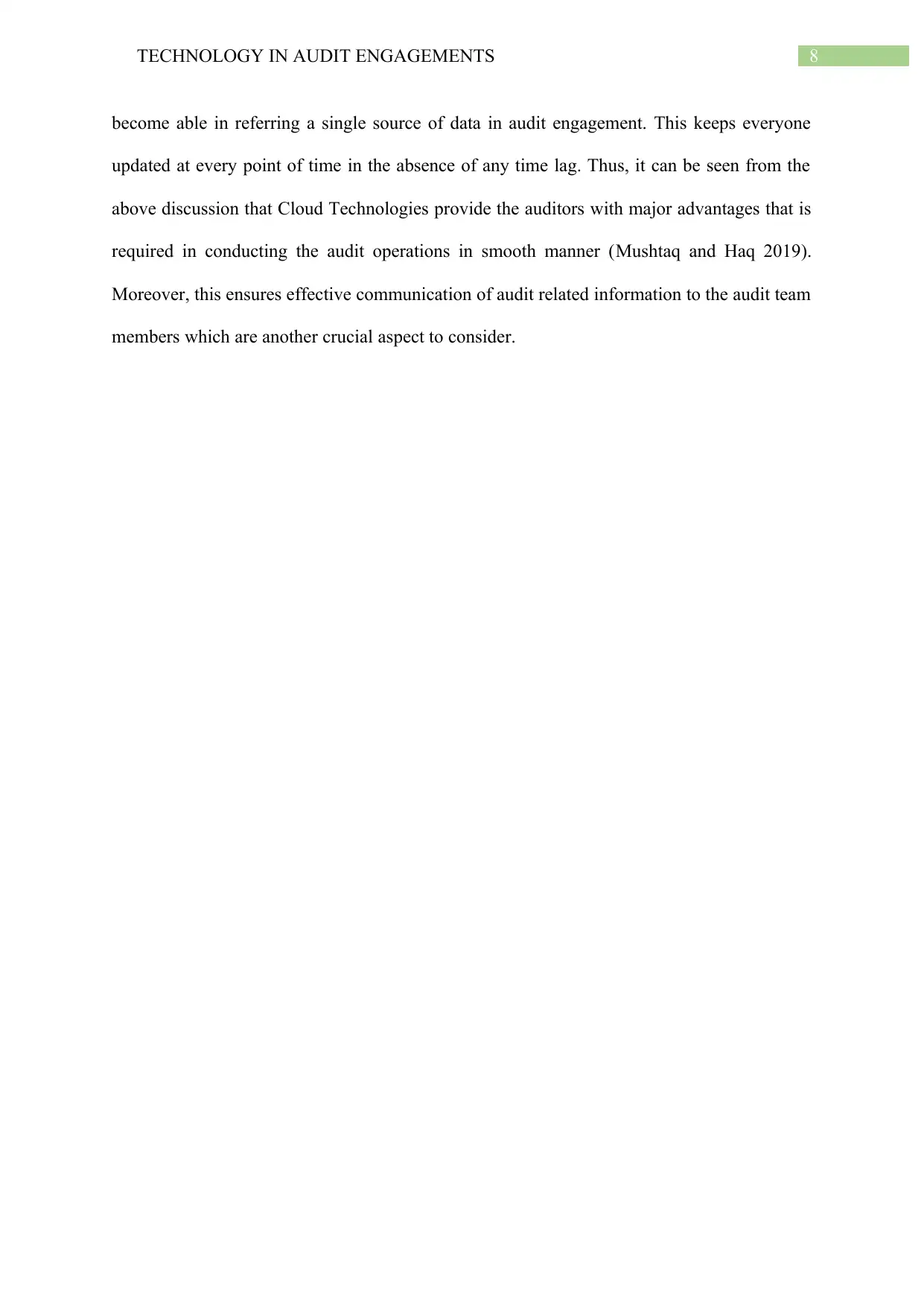
8TECHNOLOGY IN AUDIT ENGAGEMENTS
become able in referring a single source of data in audit engagement. This keeps everyone
updated at every point of time in the absence of any time lag. Thus, it can be seen from the
above discussion that Cloud Technologies provide the auditors with major advantages that is
required in conducting the audit operations in smooth manner (Mushtaq and Haq 2019).
Moreover, this ensures effective communication of audit related information to the audit team
members which are another crucial aspect to consider.
become able in referring a single source of data in audit engagement. This keeps everyone
updated at every point of time in the absence of any time lag. Thus, it can be seen from the
above discussion that Cloud Technologies provide the auditors with major advantages that is
required in conducting the audit operations in smooth manner (Mushtaq and Haq 2019).
Moreover, this ensures effective communication of audit related information to the audit team
members which are another crucial aspect to consider.
⊘ This is a preview!⊘
Do you want full access?
Subscribe today to unlock all pages.

Trusted by 1+ million students worldwide
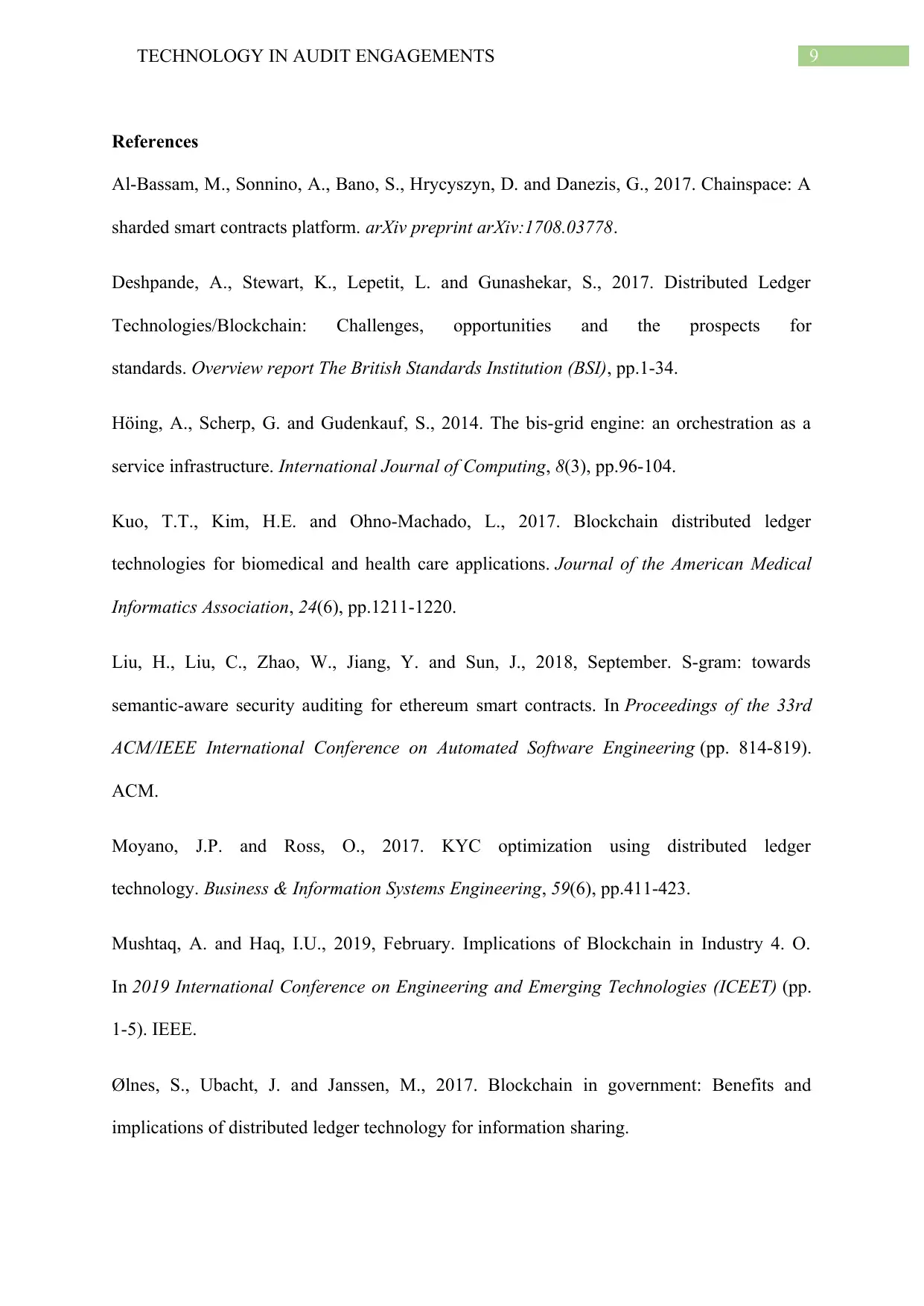
9TECHNOLOGY IN AUDIT ENGAGEMENTS
References
Al-Bassam, M., Sonnino, A., Bano, S., Hrycyszyn, D. and Danezis, G., 2017. Chainspace: A
sharded smart contracts platform. arXiv preprint arXiv:1708.03778.
Deshpande, A., Stewart, K., Lepetit, L. and Gunashekar, S., 2017. Distributed Ledger
Technologies/Blockchain: Challenges, opportunities and the prospects for
standards. Overview report The British Standards Institution (BSI), pp.1-34.
Höing, A., Scherp, G. and Gudenkauf, S., 2014. The bis-grid engine: an orchestration as a
service infrastructure. International Journal of Computing, 8(3), pp.96-104.
Kuo, T.T., Kim, H.E. and Ohno-Machado, L., 2017. Blockchain distributed ledger
technologies for biomedical and health care applications. Journal of the American Medical
Informatics Association, 24(6), pp.1211-1220.
Liu, H., Liu, C., Zhao, W., Jiang, Y. and Sun, J., 2018, September. S-gram: towards
semantic-aware security auditing for ethereum smart contracts. In Proceedings of the 33rd
ACM/IEEE International Conference on Automated Software Engineering (pp. 814-819).
ACM.
Moyano, J.P. and Ross, O., 2017. KYC optimization using distributed ledger
technology. Business & Information Systems Engineering, 59(6), pp.411-423.
Mushtaq, A. and Haq, I.U., 2019, February. Implications of Blockchain in Industry 4. O.
In 2019 International Conference on Engineering and Emerging Technologies (ICEET) (pp.
1-5). IEEE.
Ølnes, S., Ubacht, J. and Janssen, M., 2017. Blockchain in government: Benefits and
implications of distributed ledger technology for information sharing.
References
Al-Bassam, M., Sonnino, A., Bano, S., Hrycyszyn, D. and Danezis, G., 2017. Chainspace: A
sharded smart contracts platform. arXiv preprint arXiv:1708.03778.
Deshpande, A., Stewart, K., Lepetit, L. and Gunashekar, S., 2017. Distributed Ledger
Technologies/Blockchain: Challenges, opportunities and the prospects for
standards. Overview report The British Standards Institution (BSI), pp.1-34.
Höing, A., Scherp, G. and Gudenkauf, S., 2014. The bis-grid engine: an orchestration as a
service infrastructure. International Journal of Computing, 8(3), pp.96-104.
Kuo, T.T., Kim, H.E. and Ohno-Machado, L., 2017. Blockchain distributed ledger
technologies for biomedical and health care applications. Journal of the American Medical
Informatics Association, 24(6), pp.1211-1220.
Liu, H., Liu, C., Zhao, W., Jiang, Y. and Sun, J., 2018, September. S-gram: towards
semantic-aware security auditing for ethereum smart contracts. In Proceedings of the 33rd
ACM/IEEE International Conference on Automated Software Engineering (pp. 814-819).
ACM.
Moyano, J.P. and Ross, O., 2017. KYC optimization using distributed ledger
technology. Business & Information Systems Engineering, 59(6), pp.411-423.
Mushtaq, A. and Haq, I.U., 2019, February. Implications of Blockchain in Industry 4. O.
In 2019 International Conference on Engineering and Emerging Technologies (ICEET) (pp.
1-5). IEEE.
Ølnes, S., Ubacht, J. and Janssen, M., 2017. Blockchain in government: Benefits and
implications of distributed ledger technology for information sharing.
Paraphrase This Document
Need a fresh take? Get an instant paraphrase of this document with our AI Paraphraser
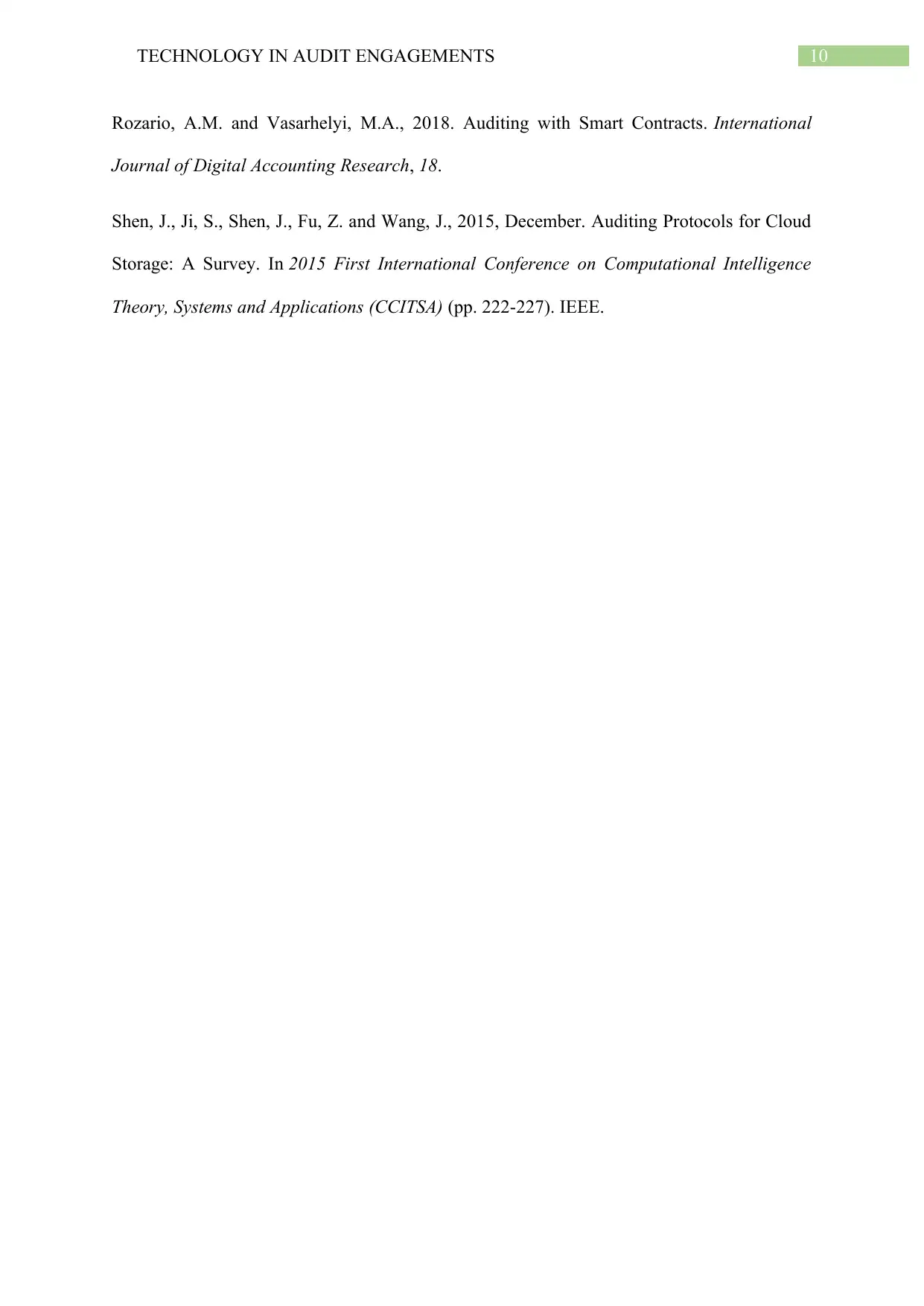
10TECHNOLOGY IN AUDIT ENGAGEMENTS
Rozario, A.M. and Vasarhelyi, M.A., 2018. Auditing with Smart Contracts. International
Journal of Digital Accounting Research, 18.
Shen, J., Ji, S., Shen, J., Fu, Z. and Wang, J., 2015, December. Auditing Protocols for Cloud
Storage: A Survey. In 2015 First International Conference on Computational Intelligence
Theory, Systems and Applications (CCITSA) (pp. 222-227). IEEE.
Rozario, A.M. and Vasarhelyi, M.A., 2018. Auditing with Smart Contracts. International
Journal of Digital Accounting Research, 18.
Shen, J., Ji, S., Shen, J., Fu, Z. and Wang, J., 2015, December. Auditing Protocols for Cloud
Storage: A Survey. In 2015 First International Conference on Computational Intelligence
Theory, Systems and Applications (CCITSA) (pp. 222-227). IEEE.
1 out of 11
Related Documents
Your All-in-One AI-Powered Toolkit for Academic Success.
+13062052269
info@desklib.com
Available 24*7 on WhatsApp / Email
![[object Object]](/_next/static/media/star-bottom.7253800d.svg)
Unlock your academic potential
Copyright © 2020–2026 A2Z Services. All Rights Reserved. Developed and managed by ZUCOL.





